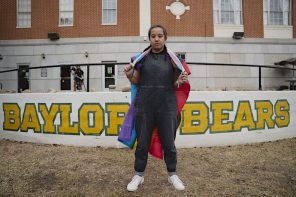While Chase Strangio, the ACLU attorney who serves as lead counsel on trans high school student Gavin Grimm’s case, is understandably disappointed with the latest development, he stressed that Grimm has already made an indelible mark on history.
“We will never be able to measure the extent to which Gavin [Grimm] changed the course of history,” Strangio wrote on Sunday. “Change is simply not quantifiable in that way. But what is impossible to deny is how, over the past six months as Gavin’s story captivated the public, we all learned, and grew, and moved together. We moved the needle toward justice and helped a larger group of the American public see us — trans people — as human.”
That’s a conclusion that at least two federal judges agree with so strongly, they penned what may be the most emotionally stirring piece of legal writing that I’ve read to date. The four-page ruling is worth reading in its entirety, though the section that Strangio highlights is indeed “striking because it reads almost verbatim like the story we, as advocates, have been telling about this case — it is not about restrooms but about our ability to participate in public life.”
Senior Fourth Circuit Judge Andre M. Davis, writing a concurrence joined by Judge Henry F. Ford, places the 17-year-old trans boy (identified in court filings as G.G.) in fitting revolutionary company. Davis writes (emphasis added):
Our country has a long and ignominious history of discriminating against our most vulnerable and powerless. We have an equally long history, however, of brave individuals—Dred Scott, Fred Korematsu, Linda Brown, Mildred and Richard Loving, Edie Windsor, and Jim Obergefell, to name just a few—who refused to accept quietly the injustices that were perpetuated against them. It is unsurprising, of course, that the burden of confronting and remedying injustice falls on the shoulders of the oppressed. These individuals looked to the federal courts to vindicate their claims to human dignity, but as the names listed above make clear, the judiciary’s response has been decidedly mixed. Today, G.G. adds his name to the list of plaintiffs whose struggle for justice has been delayed and rebuffed; as Dr. King reminded us, however, “the arc of the moral universe is long, but it bends toward justice.” G.G.’s journey is delayed but not finished.
G.G.’s case is about much more than bathrooms. It’s about a boy asking his school to treat him just like any other boy. It’s about protecting the rights of transgender people in public spaces and not forcing them to exist on the margins. It’s about governmental validation of the existence and experiences of transgender people, as well as the simple recognition of their humanity. His case is part of a larger movement that is redefining and broadening the scope of civil and human rights so that they extend to a vulnerable group that has traditionally been unrecognized, unrepresented, and unprotected.
G.G.’s plight has shown us the inequities that arise when the government organizes society by outdated constructs like biological sex and gender. Fortunately, the law eventually catches up to the lived facts of people; indeed, the record shows that the Commonwealth of Virginia has now recorded a birth certificate for G.G. that designates his sex as male.
The judge closes his decision by including a powerful poem by Palestinian-American poet Naomi Shihab Nye, titled “Famous.” Grimm, Davis implies, is “famous” in the sense outlined in the poem, which explores the fame of every little thing, relative to the objects and people and struggles in its orbit. While Davis argues that Grimm may never be famous “in the hollowed-out Hollywood sense of the term,” Grimm’s well-earned fame has already reached far beyond his preliminary orbit.
Meanwhile, as Mark Joseph Stern points out, the Nebraska Supreme Court’s rejection of the state’s ban on gay foster parents didn’t mince words. Referring to a memo on the state Department of Health and Human Services website declaring that foster parenting was for “heterosexuals only,” Justice John Wright wrote that “It is legally indistinguishable from a sign reading ‘Whites Only’ on the hiring-office door.”
Debate will justifiably continue about the cultural appropriateness of that particular analogy, but Wright nails it by specifying that it certainly applies in this context. Click the link above to read Stern’s take and more of the ruling.




